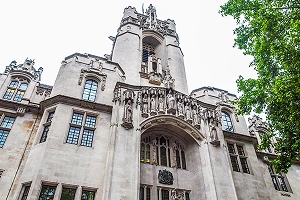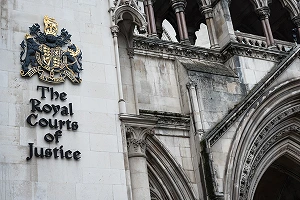
Litigation as stewardship: How UK pension funds including LGPS are shaping corporate accountability
Revisiting Cheshire West
Wardship and Inherent Jurisdiction: Decisions involving competent 17-year-olds
Public children law case update – Autumn 2025
Post-placement contact under the Adoption and Children Act 2002

Six months in, six key differences: How the Procurement Act measures up to the Green Paper
Compulsory purchase compensation reforms: the next stage
Climate legal risk and property: what local authorities need to know
The £5bn Pride in Place programme – what does it mean for local authorities?
How not to control second homes

Twelve New Towns for the Future
Authority to participate in legal proceedings and rights of audience
Artificial intelligence in Education and EHC Plans
Just what is it about today’s planning system that makes appealing so … appealing?
High Court on highway widths
Risk assessment – a safeguard to fairness
Appealing the outcome of a fact-finding hearing in care proceedings
Parental obstruction of care
School exclusions – CCTV and police investigations?
Transparency in the Court of Protection
Break Stuff – The decision in On Tower UK Ltd v British Telecommunications plc [2025] and the impact in respect of break rights in Code Agreements
Tackling youth ASB in social housing
Understanding part-heard hearings in civil litigation
How AI could rewrite homelessness law
Social and affordable housing as a driver of economic growth
Suitability of accommodation offered in performance of the prevention duty
Key updates to the Administrative Court Guide
A gem of a case on section 106 mortgagee exclusion clauses?
Why are so many schools and colleges suspending pupils?
PFI expiry and handback
Payment requirements under the Procurement Act 2023
Civil protective orders and gangs
"Build baby build" – How MHCLG will change now Steve Reed is Secretary of State
Dual-hatted members and local government reorganisation
Hillsborough Law: What local authorities need to know
School admissions: A guide to parental rights
A hard road
Gypsy/Traveller caravan sites and supply of pitches
Environmental enforcement powers: Walker v Chelmsford City Council [2020] EWHC 635 revisited
Infrastructure project ‘fast-track’ process ‘re-design’ proposed
A different kind of target
DOLS and the Young Offender: Care or Custody?
Brief enquiry of age
Fact-finding in care proceedings: lessons from G (A Child)
School trips: key legal considerations
Below-threshold contracts
Tim Care examines the Procurement Act 2023's regime for below-threshold contracts and highlights key practical considerations for contracting authorities.
- Details
The Procurement Act 2023 (the Act) came into force on 24th February 2025.
The Act, in particular, revoked the following:
- Public Contracts Regulations 2015 (PCR)
- Concession Contracts Regulations 2016
- Utilities Contracts Regulations 2016
Definitions
A “below-threshold contract” is defined in Section 5 of the Act, as a contract for goods, services, or works whose estimated value is below the statutory threshold for that type of contract. The threshold amounts are outlined in Schedule 1.
Below-threshold contracts are not considered “public contracts” and therefore fall outside the scope of a “covered procurement” under Section 1 of the Act. As a result, contracting authorities are afforded much greater flexibility when conducting a procurement than for above-threshold contracts.
A ‘notifiable below-threshold contract’ is a regulated below threshold contract with, if it is being awarded by a central government authority (including the NHS), a value of not less than £12,000 or, if it is being awarded by any other contracting authority, a value of not less than £30,000.
Publication requirements
Authorities are not obliged to advertise below-threshold procurements when they invite quotes, proposals or tenders from a closed / targeted group of suppliers (provided the authority does not advertise the procurement in any other way).
However, if a contracting authority chooses to advertise a ‘notifiable below-threshold contract’ the authority must publish a Below-Threshold Tender Notice on the Central Digital Platform (before advertising anywhere else).
The contracting authority must provide a reasonable time period in the Below-Threshold Tender Notice for the submission of tenders and this should be the same period for all suppliers (Section 87(6)).
Section 87(3) provides that as soon as reasonably practicable after entering into a notifiable below-threshold contract, the contracting authority must publish a Contract Details Notice. This applies to all notifiable below-threshold contracts, and not just those which require the publication of a Below-Threshold Tender Notice. The guidance stresses that a Contract Details Notice is required even where a contracting authority has not published a Below-Threshold Tender Notice because it has only sought a quote from a single supplier.
Supplier suitability
Section 85(1) prohibits a separate pre-qualification stage for below-threshold contracts when conducting a competitive procurement. Authorities cannot filter suppliers in advance by financial standing, technical ability, or past performance. Suitability information may only be considered at the award stage.
To be clear, contracting authorities are able to request suitability information before awarding a contract to a supplier without competition.
Furthermore, Section 86 requires contracting authorities to consider barriers faced by SMEs and to take proportionate steps to reduce them.
Modifications and Convertible Contracts
Below-threshold contracts may be freely modified under the Act.
However, if a modification increases the value of a below-threshold contract so that it exceeds the relevant threshold in Schedule 1, the contract becomes a “convertible contract.” In these circumstances, the modification must follow the same process for above threshold contracts as outlined in Section 74. A Contract Change Notice must also be published to document this modification in accordance with Section 75.
This rule ensures that contracting authorities cannot avoid the Act’s main safeguards by artificially keeping a contract below threshold and then significantly expanding its value after award.
Key differences from the PCR Regime
The Act introduces several changes compared to the Public Contracts Regulations 2015 (PCR):
- NHS Trusts are now subject to the £12,000 central government threshold whereas, under the PCR, they were treated as a sub-central authority with a £30,000 threshold;
- The prohibition against supplier suitability pre-qualification remains, but the Act removes the ability to report deviations as was done under the PCR;
- The Act allows below-threshold contracts to be reserved for UK or local suppliers, which was not possible under the PCR.
Common misunderstandings in practice
A review of the Central Digital Platform indicates that many authorities are publishing notices unnecessarily for below-threshold procurements.
For clarity, the only notices that authorities must publish for notifiable below-threshold contracts are:
- A Below-Threshold Tender Notice (if the contract is advertised); and
- A Contract Details Notice.
Other notices — such as Contract Change or Termination Notices — are only required if a modification turns the contract into an above-threshold convertible contract.
What does this mean?
The Act provides contracting authorities far greater discretion and flexibility when handling low-value procurements, while aiming to ensure transparency and fair access for smaller suppliers.
Moving forward, authorities should:
- Apply the thresholds in Schedule 1 correctly to determine their obligations under the Act;
- Recognise that advertising for low-value procurements is discretionary, but if a notifiable below-threshold contract is advertised, a Below-Threshold Tender Notice must be published;
- Avoid unnecessary notices that are not required for low-value procurements;
- Remove pre-qualification hurdles for a competitive low-value procurement and instead assess suitability at award stage; and
- Monitor contract modifications carefully to avoid inadvertently converting a below-threshold contract into a public contract.
Tim Care is a partner at Ward Hadaway.
Lawyer - Property
Trust Solicitor (Public & Healthcare Law)
Trust Solicitor (Employment & Contract Law)
Senior Lawyer - Contracts & Commercial
Contracts & Procurement Lawyer
Locums
 Institutional landlord series: Possession – High Court Enforcement - 5 Pump Court
Institutional landlord series: Possession – High Court Enforcement - 5 Pump Court
22-10-2025 4:00 pm
Online (live)
 Institutional landlord series: Costs Recovery and Legally Aided Parties - 5 Pump Court
Institutional landlord series: Costs Recovery and Legally Aided Parties - 5 Pump Court
05-11-2025 4:00 pm
Online (live)
 HMPL Building Blocks: Tenancy Management – Assignment, Mutual Exchange and Succession - Devonshires
HMPL Building Blocks: Tenancy Management – Assignment, Mutual Exchange and Succession - Devonshires
12-03-2026
Online (live)
 Unpicking the Procurement Act Episode 2: Exclusion and Debarment - 39 Essex Chambers
Unpicking the Procurement Act Episode 2: Exclusion and Debarment - 39 Essex Chambers
On Demand
Online (pre-recorded)
 Unpicking the Procurement Act Episode 1: Overview and New Procedures - 39 Essex Chambers
Unpicking the Procurement Act Episode 1: Overview and New Procedures - 39 Essex Chambers
On Demand
Online (pre-recorded)
 Unpicking the Procurement Act Episode 3: Contract Modification - 39 Essex Chambers
Unpicking the Procurement Act Episode 3: Contract Modification - 39 Essex Chambers
On Demand
Online (pre-recorded)
 Unpicking the Procurement Act Episode 4: Challenges and Remedies - 39 Essex Chambers
Unpicking the Procurement Act Episode 4: Challenges and Remedies - 39 Essex Chambers
On Demand
Online (pre-recorded)



























































































 CUBAS Comprehensive Training & Licencing (Swindon), October 2025
CUBAS Comprehensive Training & Licencing (Swindon), October 2025  Property Law Roadshow 2025 - Cardiff - St John's Chambers
Property Law Roadshow 2025 - Cardiff - St John's Chambers  Planning Day 2025 - Cornerstone Barristers
Planning Day 2025 - Cornerstone Barristers  Annual Fraud Conference 2025 - Oxford Investigation Service
Annual Fraud Conference 2025 - Oxford Investigation Service  Ivy Legal - Certificate in Planning Enforcement
Ivy Legal - Certificate in Planning Enforcement